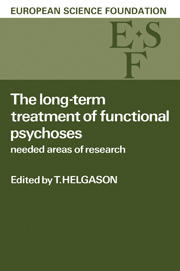Book contents
- Frontmatter
- Contents
- List of Participants
- Introduction
- I Organisational Aspects of Long-term Treatment
- II Patients Aspects of Long-term Treatment
- Needed are as of research in psychological treatments for functional psychoses
- Family therapy as part of the treatment of schizophrenia
- Milieu therapy in the long-term treatment offunctional psychoses: needed areas of research
- Long-term treatment of functional psychosis with neuroleptics
- Lithium and prophylaxis in manic-depressive illness
- New perspectives in psychopharmacology
- Research implications of recent trends in the treatment of schizophrenia
- Long-term treatment of functional psychoses in childhood and adolescence
- Functional psychosis in old age
- Chronicity and hospitalization: can the viciouscirclesbe broken?
- Social network and the long-term course of mental disorders - research needs
- III Public Health Aspectsof Long-term Treatment
- Index
New perspectives in psychopharmacology
from II - Patients Aspects of Long-term Treatment
- Frontmatter
- Contents
- List of Participants
- Introduction
- I Organisational Aspects of Long-term Treatment
- II Patients Aspects of Long-term Treatment
- Needed are as of research in psychological treatments for functional psychoses
- Family therapy as part of the treatment of schizophrenia
- Milieu therapy in the long-term treatment offunctional psychoses: needed areas of research
- Long-term treatment of functional psychosis with neuroleptics
- Lithium and prophylaxis in manic-depressive illness
- New perspectives in psychopharmacology
- Research implications of recent trends in the treatment of schizophrenia
- Long-term treatment of functional psychoses in childhood and adolescence
- Functional psychosis in old age
- Chronicity and hospitalization: can the viciouscirclesbe broken?
- Social network and the long-term course of mental disorders - research needs
- III Public Health Aspectsof Long-term Treatment
- Index
Summary
From the breakthrough in psychopharmacology in the 1950s, the next 20 years were spent consolidating the bridgeheads both in theory and in practice. What is needed to-day is differentiation in the use of more specific drugs in more precisely defined groups of patients; it is my tenet that this next step will only be accomplished by ‘operationalization’ and integration of what is actually already in our hands. I shall use the monoamineoxidase inhibitors to illustrate the following points.
Operationalization and standardization of clinical assessment.
Application of more specific drugs.
Monitoring of the more relevant changes induced by treatment (a) biochemically, (b) pharmacologically and (c) clinically.
Why monoamineoxidase inhibitors? Because they were, in the early 1950sat the forefront of the first wave of new drugs and enthusiasm but, due to the lack of the tools and understanding I now hope for, they fell into ill-repute and were abandoned by most clinicians, even by whole countries.
Operationalization and standardization of clinical assessment
For nearly 40 years, clinicians have had the feeling that there were types of depressions responding better or only to monoamine oxidase (MAO)-inhibitors. But whenever it was tried to prove this tenet by comparisons in well-planned studies, the results were disappointing. The most notorious case was the British Medical Research Council study from 1965 where the MAO-inhibitor phenelzine was found to be inferior not only to electroconvulsive therapy (ECT) and to imipramine, but also to a placebo - the latter difference was, fortunately enough, not statistically significant (Shepherd, 1965). Ever since, many clinicians have argued that it was indeed the atypical depressive patients who were candidates for MAO-inhibitor (MAOI) treatment and that such patients rarely entered psychiatric hospitals and departments and that it therefore was not surprising that the results with hospitalized patients were rather disappointing (Quitkin et al., 1981).
So what is atypical depression? Many will say that, compared to classical endogenous depression (melancholia), it is depressive states characterized by
phasic course less pronounced with long-lasting symptom-free periods;
no diurnal variation, but often with day-to-day variation;
mood change less marked, less total, less pitiful;
anxiety more prominent than in depression;
irritability instead of self-reproach;
demands and active appeal instead of excuses and passive appeal;
reactivity to personal contacts.
- Type
- Chapter
- Information
- The Long-Term Treatment of Functional PsychosesNeeded Areas of Research, pp. 115 - 122Publisher: Cambridge University PressPrint publication year: 1985

